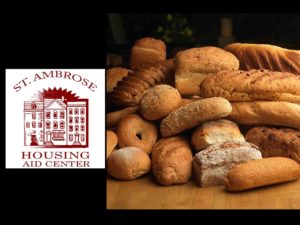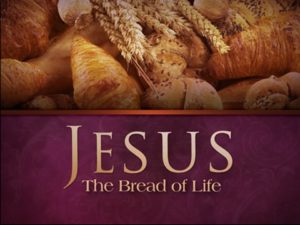Can we believe in the gift and promises of Jesus? Can we trust in this ‘bread of life’ from heaven? We, like the crowds that surrounded Jesus, would welcome just one more miracle, one more sign, one more ‘coincidence’ to prove that these words of Jesus are true.
Right out of college I served for a year in the Lutheran Volunteer Corps – living in Baltimore, Maryland in a big, old, former parsonage of a house – with five other fresh out of college people.
We all worked in different organizations and agencies. We were volunteers, although technically we did receive compensation – our rent/utilities were covered, we received $45 for a monthly bus pass, $80 per month to be used for food – and $85 per month for personal use – in other words, not a lot. This was 1992.
Needless to say, when on occasion, we were invited to someone’s house for dinner or a housemate’s parents came into town, offering to take us all out – we readily accepted. Anything to break up the lentil and ramen meals at the house.
I worked that year at an agency called St Ambrose Housing Center – this organization worked on providing decent, affordable housing for low income folks along with a lot of other great programs. It was a great place to be.
One of the great perks as a volunteer at St. Ambrose was that every Thursday, an amazing bakery from the neighborhood would show up with a massive brown paper bag full of day old bread – huge loaves of crusty bread, focaccia, a variety of sweet and savory.
I don’t have to tell you, but the staff and the clients – whomever was around that day, would descend upon that bread – a seemingly bottomless bag. Of course, my housemates loved bread day, because I always came home with loaves to share.
This may not be exactly “The Bread of Life” of which Jesus speaks in today’s gospel reading, but on the other hand, maybe it gives us a bit of a glimpse of that Jesus bread too – the joy of an unexpected gift.
In these weeks of Lent we are picturing Jesus – considering a few of the compelling images of Jesus’ work and ministry and their call and impact on our lives.
We started last week with Jesus’ offer of “Living Water” to the Samaritan woman he encountered at Jacob’s Well – Living water to quench the thirst – to bring meaning, purpose and abundance to life.
We, like the woman, can find ourselves tired – weary from the hard work – the constant need to draw water to sustain and maintain our lives – how much better to receive this gift of God – to tap into that source that will never run dry – that will never run out?
In experiencing the gift of this living water, we might respond to this offer from Jesus in the same way the Samaritan woman did, when she said: “Sir, give me this water” (John 4:15).
And then, along comes Jesus again, two chapters later, and this time the topic is bread and instead of an audience of one, it is a crowd, and they haven’t just witnessed a miracle – they were a part of it – the feeding of the 5000+ – and they want to know what just happened – and so they track down Jesus across the lake – they want to know, Rabbi – who are you?
Jesus teases them – are you looking for me because you had a God-moment with me? Or maybe its because you got a free meal – and you are looking for another one?
But they won’t be deterred – like the woman at the well, the crowd gets serious – what do we have to do Jesus to perform the works of God like you?
Jesus’ simple response – believe in the one whom God has sent.
They don’t really love this answer and they puff up and get a little indignant – and they play the “my great-grandparents built this church card” when they say, “Our ancestors ate the manna in the wilderness, as it is written, ‘Moses gave them bread from heaven to eat’”(John 6:31).
To which Jesus calls them out: “Very truly, I tell you, it was not Moses who gave you the bread from heaven, but it is my Father who gives you the true bread from heaven (John 6:32).
It wasn’t an act of Moses that saved their ancestors in the wilderness, it was an act of God. God is the one. God is the one who provides this bread of heaven that brings life to the world.
With that, the crowd is done with their verbal jousting and they offer a request – one that is similar to the woman at the well when they say, “Sir, give us this bread always” (John 6:34).
And yet, the woman and the crowd – do they really know what they’re asking? When we pray for God’s healing or presence or for peace and mercy for our lives and the world – are we prepared for God’s response?
This is the challenge of the gospel – it comes into our lives, disrupts the neat and tidy box that we’ve put God into, and surprises, even shocks us, with audacious promises of life and wholeness.
And that’s hard, because on a day-to-day basis, most of us have gotten pretty good at defending ourselves from the pain and frustration and despair of life in this world. And then these promises of God are announced and they betray the foolishness of our self-reliance and at the same time promise us more than we could ever hope for. (David Lose, In the Meantime, The Surprise of our Lives, JOHN 6 24-35, July 2015)
Can we believe it? Can we trust it? We, like the crowd, would welcome just one more miracle, one more sign, one more ‘coincidence’ to prove that these words of Jesus are true.
But, here’s the truth, our God is a God of surprises and upheavals – rather than do what God is supposed to do, God does the unexpected: instead of pronouncing judgment in the face of our sin and selfishness, God offers mercy; instead of justice, love; instead of condemnation, forgiveness; instead of coming in power, God came in weakness; and instead of giving us a miracle, God gives us God’s own self.
For as Martin Luther reminds us, the whole of Jesus’ life, death, and resurrection is summed up succinctly in the two words we hear when coming to the Table: “for you.” This is Christ’s body, given for you. This is Christ’s blood, shed for you. (David Lose, In the Meantime, The Surprise of our Lives, JOHN 6 24-35, July 2015)
The Bread of Life – the Living Waters – these gifts and promises that become the sacraments of the church – God’s words of love and forgiveness, given in a form which we can receive – God’s physical, visible presence for God’s physical, visible people.
When we come forward to receive the gifts of God’s table – we are connected again to these words of Jesus – to the gift of the bread of life broken for us that we may both receive and join in God’s redeeming work in the world.
Amen.
Rev. John Berg
Gloria Dei Lutheran Church, Northbrook, IL







